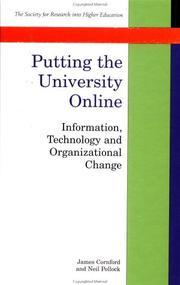| Listing 1 - 5 of 5 |
Sort by
|

ISBN: 0335210066 0335210058 9780335210053 9780335210060 Year: 2003 Publisher: Buckingham Open university press
Abstract | Keywords | Export | Availability | Bookmark
 Loading...
Loading...Choose an application
- Reference Manager
- EndNote
- RefWorks (Direct export to RefWorks)
Education, Higher --- Virtual reality in education --- Distance education --- Enseignement supérieur --- Réalité virtuelle en éducation --- Enseignement à distance --- Computer network resources --- Effect of technological innovations on --- Information électronique --- Effets des innovations sur --- 371.018.43 --- 378 --- Afstandsonderwijs. Fernstudium. E-learning. E-teaching --- Hoger onderwijs. Universitair onderwijs --(algemeen) --- 378 Hoger onderwijs. Universitair onderwijs --(algemeen) --- 371.018.43 Afstandsonderwijs. Fernstudium. E-learning. E-teaching --- Enseignement supérieur --- Réalité virtuelle en éducation --- Enseignement à distance --- Information électronique --- Education, Higher - Computer network resources --- Education, Higher - Effect of technological innovations on
Book
ISBN: 9780198704928 0198704925 Year: 2016 Publisher: Oxford, United Kingdom Oxford University Press
Abstract | Keywords | Export | Availability | Bookmark
 Loading...
Loading...Choose an application
- Reference Manager
- EndNote
- RefWorks (Direct export to RefWorks)
Industry analysts are in the business of shaping the technological and economic future. They attempt to 'predict' what will become the next big thing; to spot new emerging trends and paradigms; to decide which hi-tech products will win out over others and to figure out which technology vendors can deliver on their promises. In just a few short years, they have developed a surprising degree of authority over technological innovation. Yet we know very little, if anything, about them. This book seeks to explain how this was achieved and on what this authority rests. Who are the experts who increasingly command the attention of vendor and user communities? What is the nature of this new form of technical and business knowledge? How Industry Analysts Shape the Digital Future offers the first book length study into this rarely scrutinized form of business expertise. Contributions to this volume show how, from a small group of mainly North American players which arose in the 1970s, Gartner Inc. has emerged as clear leader of a $6 billion industry that involves several hundred firms worldwide. Through interviews and observation of Gartner Inc. and other industry analyst firms, the book explores how these firms create their predictions, market classifications and rankings, as well as with how these outputs are assessed and consumed. The book asks why many social scientists have ignored the proliferation of these new forms of management and technical expertise. In some cases scholars have 'deflated' this kind of business acumen, portraying it as arbitrary knowledge whose methods and content do not deserve enquiry. The valuable exception here has been the path-breaking work on the 'performativity' of economic, financial or accounting knowledge. Drawing upon recent performativity arguments, the book argues the case for a Sociology of Business Knowledge. (provided by publisher)
Information technology --- Industries --- Business analysts --- Knowledge management --- Sociological aspects --- Information services --- Technological innovations
Book
ISBN: 9780203891940 9780415403979 Year: 2008 Publisher: Abingdon Routledge
Abstract | Keywords | Export | Availability | Bookmark
 Loading...
Loading...Choose an application
- Reference Manager
- EndNote
- RefWorks (Direct export to RefWorks)
Computer software industry --- Management information systems
Book
ISBN: 0191774022 Year: 2016 Publisher: Oxford : Oxford University Press,
Abstract | Keywords | Export | Availability | Bookmark
 Loading...
Loading...Choose an application
- Reference Manager
- EndNote
- RefWorks (Direct export to RefWorks)
Industry analysts are in the business of shaping the technological and economic future. They attempt to 'predict' what will become the next big thing; to spot new emerging trends and paradigms; to decide which hi-tech products will win out over others and to figure out which technology vendors can deliver on their promises. In just a few years, they have developed a surprising degree of authority over technological innovation. Yet we know very little, if anything about them. This book seeks to explain how this was achieved and on what this authority rests.
Business analysts. --- Knowledge management --- Information technology --- Information technology --- Social aspects. --- Social aspects. --- Technological innovations.
Book

ISBN: 9781787695573 1787695573 9781787695597 178769559X 1787695581 1787695603 9781787695580 Year: 2019 Publisher: Bingley Emerald Publishing
Abstract | Keywords | Export | Availability | Bookmark
 Loading...
Loading...Choose an application
- Reference Manager
- EndNote
- RefWorks (Direct export to RefWorks)
This volume introduces the notion of Thinking Infrastructures to explore a broad range of phenomena that structure attention, shape decision-making, and guide cognition: Thinking Infrastructures configure entities (via tracing, tagging), organise knowledge (via search engines), sort things out (via rankings and ratings), govern markets (via calculative practices, including algorithms), and configure preferences (via valuations such as recommender systems). Thus, Thinking Infrastructures, we collectively claim in this volume, inform and shape distributed and embodied cognition, including collective reasoning, structuring of attention and orchestration of decision-making.
Knowledge management --- Decision making --- E-books --- Knowledge management. --- Decision making. --- Deciding --- Decision (Psychology) --- Decision analysis --- Decision processes --- Making decisions --- Management --- Management decisions --- Choice (Psychology) --- Problem solving --- Management of knowledge assets --- Information technology --- Intellectual capital --- Organizational learning --- Sociology of organization --- Business & Economics, Infrastructure. --- Sociology: work & labour.
| Listing 1 - 5 of 5 |
Sort by
|

 Search
Search Feedback
Feedback About UniCat
About UniCat  Help
Help News
News